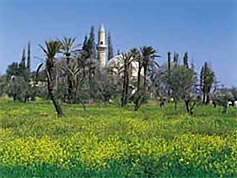Property in Larnaca
 During the 17th century, Larnaca was the diplomatic and trading capital of Cyprus and it boast foundations of great antiquity. It was allegedly founded by Noah´s son Khittim, who was mentioned in the Bible.
During the 17th century, Larnaca was the diplomatic and trading capital of Cyprus and it boast foundations of great antiquity. It was allegedly founded by Noah´s son Khittim, who was mentioned in the Bible.
Nowadays Larnaca is a modern, thriving, seaside tourist town, with a large shopping centre, several museums and upmarket bars and restaurants. The real estate market in Larnaca is concentrated on two main markets; the tourist market of the coast and the residential market in the city centre, catering for its growing population (currently 120,000).
As a small town, Larnaca has the advantage of offering villas in quiet relaxing areas only 100 meters from the sea, while being located only 10 minutes drive from the centre of Larnaca and its international airport. Rentals in the town of Larnaca are year round, however holiday home rentals prove to be the most lucrative for property investors and can provide very good returns. 90% of all holiday homes in Larnaca are sought after by British holidaymakers.
The local economy is largely geared towards tourism and is home to the island's main international airport, offering many visitors their first taste of Cyprus.
One of Larnaca's most distinctive features is the mid-town seaside promenade lined with tall palm trees and a project to improve the area around the promenade - known as the Finikoudhes - and turn it into a large precinct bordered by tavernas and a sandy beach was recently completed. Nearby is the Larnaca marina, one of the few shelters for yachts on the island (though several new ones are currently under construction in other towns). Palm trees and minarets which dot the horizon also give Larnaca a Middle Eastern atmosphere, particularly within the old inner city.
The advantages of Larnaca as a tourist resort are numerous: it is large enough to provide all amenities without being overcrowded, especially on its beautiful beaches which extend for 25kms. The archaeological sites and its six museums are in the centre of the city within walking distance. Summer sports, sea activities and cruises are readily available. Shops are well stocked, medical care is excellent, cinemas are screen films simultaneously with the cinemas of Europe and the USA. The variety of restaurants, cafes and bars is enormous. Try the Cyprus "meze" which is a food specialty of Larnaca. Night life is interesting and security in the streets is unsurpassed. Cultural life is rich and many events are organized by the town's municipality almost daily.
 One of the first sights upon arrival in Larnaca is the beautiful salt lake, home in the cooler months to colonies of graceful flamingos and other migratory birds. Over 10,000 flamingos arrive during the months of January and February. The salt lake quickly dries out by July and has a thick glistening salt crust nearly 10cm thick. Larnaca Salt Lake has always been the important commercially, and it is still referred to as Aliki - the Greek word for salt. A local legend tells how the area used to be filled with luscious vines and one day, Saint Lazarus {Patron Saint of Larnaca} was so thirsty he stopped and asked for some grapes. The owner told him that there were no grapes and the saint was so incensed he changed the vineyard into a salt lake!
One of the first sights upon arrival in Larnaca is the beautiful salt lake, home in the cooler months to colonies of graceful flamingos and other migratory birds. Over 10,000 flamingos arrive during the months of January and February. The salt lake quickly dries out by July and has a thick glistening salt crust nearly 10cm thick. Larnaca Salt Lake has always been the important commercially, and it is still referred to as Aliki - the Greek word for salt. A local legend tells how the area used to be filled with luscious vines and one day, Saint Lazarus {Patron Saint of Larnaca} was so thirsty he stopped and asked for some grapes. The owner told him that there were no grapes and the saint was so incensed he changed the vineyard into a salt lake!
Beside the salt lake, in a tranquil setting crowned by lush palms, is the Hala Sultan Tekesi which was built to honour the aunt of the Prophet Mohammed who accompanied the Arab invaders of Cyprus in 694AD but died after falling from a mule near Larnaca. Her shrine, the third holiest in the Moslem world after Mecca and Medina is today this wonderfully peaceful sanctuary.
Kition in Larnaca was once home to the philosopher Zeno who founded the School of Stoicism in Athens and also Lazarus, the man Jesus raised from the dead. Lazarus later became Bishop of Larnaca and his empty tomb can be seen in the crypt in the Church of St. Lazarus.
There is a causeway between the main Larnaca Salt Lake and smaller pools which leads to the village of Kiti with its famous church - the Panagia Angeloktisti (meaning ‘built by the angels) which is famous for its mosaics.
History of Larnaca
Larnaca dates back to the Bronze Age, with the Mycenaeans colonizing it in the 13th century B.C. After this time it became commercially important with the Phoenicians in the 9th century B.C. Attacked by the Greeks in 450 B.C, Larnaca did not enjoy prosperity during Roman times and was destroyed by fire in 250 B.C and later with fire by the Arabs in the 7th century A.D.
Under the Turks the city became an important trading center again and became “Larnaca”, taking its name from the Greek funeral urns…”larnax”…which were spread all over its territory. During the 17th and 18th centuries Larnaca became commercial again with foreign consuls and the British later leased Cyprus from Turkey in 1878. In 1960 Cyprus became an independent republic.
Property Investment in Larnaca
Larnaca is a coastal town that has traditionally been economically driven by the tourist industry. There are two sides to Larnaca’s property market, the growth of the main town of Larnaca and the new development of coastal holiday areas on the outskirts of Larnaca.
The growth of the main town of Larnaca is dependent on the local population’s increasing need for housing. The outskirts are driven by the demand for holiday home buyers and retirees. Purchasing property for retirement purposes is probably the major driver for Larnaca’s property market.
With a population of 120,000, Larnaca is lively throughout the year, having all the amenities that relocating foreigners may require. In fact it is a favourite among expatriates and retirees. As a small town, Larnaca has the advantages of offering villas in quiet relaxing areas only 100 meters from the sea, while being located only 10 minutes drive from the center of Larnaca and its international airport.
Rentals in the town of Larnaca are year round but these contracts but do not seem to offer sufficient returns for investors. However, rentals for holiday homes present a different picture as they are seasonal and comply with investor demands. If they are marketed properly, they can provide good returns.
90% of all holiday villas are sought after by British holidaymakers. Larnaca also seems to be preferred by Cypriot expatriates returning to Cyprus. Larnaca is attractive to many visitors because it combines a tourist destination with the facilities of a city.
The demand for Larnaca’s main town property market comes mostly from the local population, combined with some repatriate Cypriots.
Investors have realized that Larnaca’s outskirts can reach a different market of buyers than Protaras. Having its own airport, marina, English schools, shopping malls and large commercial roads and many more, Larnaca presents its own unique investment potential.
The supply of property is increasing in order to meet the increasing demand while the phenomenon of demand exceeding supply pushes prices higher. The increase in property in the outskirts of Larnaca in turn influences the prices in main Larnaca area.
For new projects, especially in the outskirts, buyers are asked to wait on average 15-20 months for delivery of their property while big developers are already expanding into new areas for development.
Current Conditions and Predictions
The industry seems to be on the up side of the property cycle with increasing demand and good expectations for the future implying the market has not yet reached its peak.
Prices in Larnaca are lower than other similar properties in Paphos and Limassol. This shows the buying power of foreign purchasers is still strong and properties with higher prices are still being sold, suggesting prices will continue to rise steadily.
Developers have been selling their properties before they begin the construction process. While profits are sufficient for investors and developers, an increasing demand is triggered, along with an increasing supply of developed properties.
Foreign investors are expected to reinvest their money in real estate in Larnaca since they already seem to be have benefited by the past years increases in property prices.




